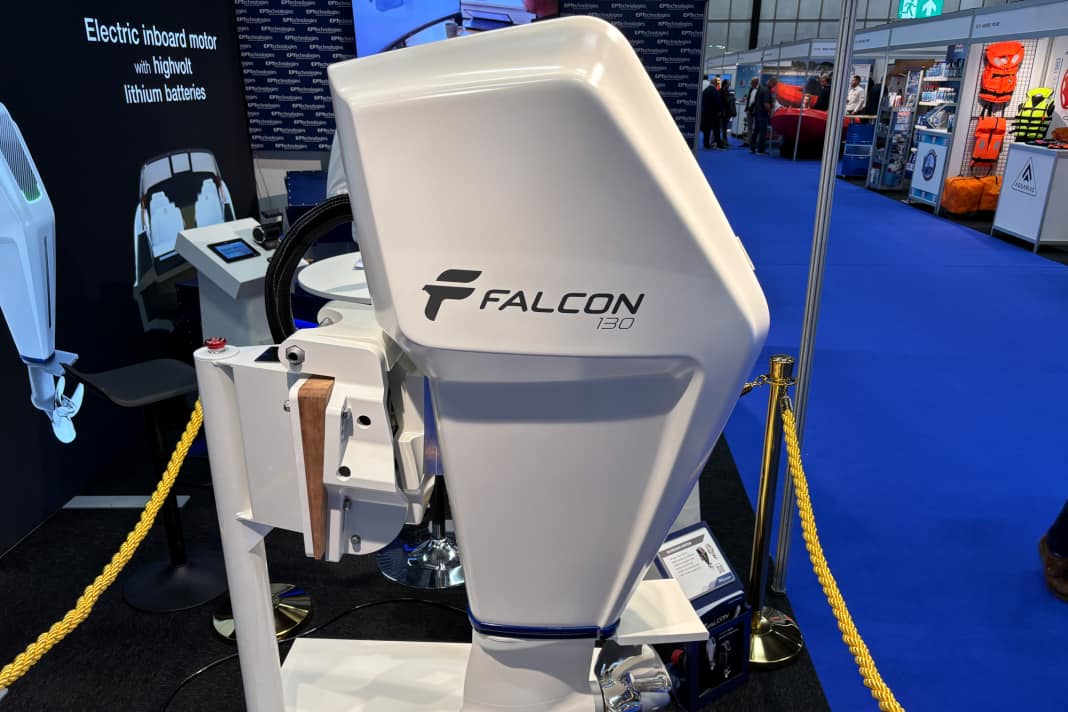E-outboard: "Falcon" celebrates its world premiere at the METS in Amsterdam
Jan-Ole Puls
· 21.11.2024






According to EPT, the outboard motor is the lightest, quietest and most efficient drive of its kind. The company aims to set new standards in the field of electric boat motors. The "Falcon" was developed from the ground up as a fully electric drive system, which sets it apart from other models.
This approach enables a more compact design and a lighter weight, which reduces water resistance. This increases efficiency and there is more space on board for additional batteries. The result is an increased range, improved performance and an overall lower environmental impact.
"Falcon" is lightweight and comes with plenty of power
With an output of 130 kW, the "Falcon" is based on an axial flux concept and weighs just 27 kg. By comparison, conventional combustion engines in the same power class often weigh over 100 kilograms, which makes the "Falcon" significantly lighter and easier to handle. This weight saving helps to improve the agility and speed of the boat, as less energy is required for the weight of the engine itself.
Another feature of the "Falcon" is the ability to adapt the shaft length to different boat types. The new electric outboard is not only suitable for leisure boats and yachts, but can also be used on lifeboats and hydrofoils. For skippers who need more power, EPTechnologies is already developing a more powerful version with 230 kW. This version will be added to the product range in the near future.
New steering system
A technical highlight of the "Falcon" is its newly developed steering system. Instead of the entire engine block rotating, only the propeller hub and the propeller itself rotate, while the engine block remains fixed. This design offers several advantages: Firstly, sensitive engine components are better protected, which increases the longevity and reliability of the system, and secondly, the fixed arrangement of the engine block improves weight distribution and stability - especially in double outboard configurations.
In addition, the propeller hub can be rotated 360 degrees, which gives the "Falcon" exceptional manoeuvrability. This should make bow thrusters superfluous for many boat types. The fact that only the underwater part of the outboard moves is not entirely new and is also used by some other manufacturers, but the 360-degree rotation sets the "Falcon" apart from other models. While Mercury, for example, also uses similar technology in its 600 hp V12 top-of-the-range model, it lacks the option of full rotation.
What EPT is also working on
In addition to the propulsion system, EPTechnologies also develops and produces its own ultra-light, highly efficient batteries. These can be customised to the specific requirements of each ship. The batteries not only help to reduce the overall weight, but also offer improved energy density. This means that more energy can be stored in less space. This is particularly important for use on ships that require maximum range and performance.
More on the topic of electric outboards:
EPT is working to further develop its battery and charging technologies to reduce charging times and extend battery life. The company aims to offer a fully integrated system that includes both propulsion and energy storage solutions so that boat owners can benefit from a seamless electric propulsion solution.
- Further information: eptechnologies.dk

Jan-Ole Puls
Editor Test & Technology
Ole Puls was born in Schleswig in 1999. He quickly swapped the football pitch for the Schlei and grew up sailing a wide variety of dinghies and tall ships. From his grandfather's self-built wooden opti and a Europe to a 49er and an X362 Sport, there was a lot to choose from. After leaving school, Puls decided to train as a boat builder at the high-tech shipyard Knierim Yachtbau in Kiel in 2016. He successfully completed his training in 2020 and stayed at the shipyard as a bachelor. In 2022, he decided not only to build boats, but also to test them. Since then, he has been working for Delius Klasing Verlag in the Test & Technology section of BOOTE magazine. The training he received and the eye for detail and quality of workmanship he acquired help him immensely today. Even though he is a regatta sailor with heart and soul, he feels right at home on motorboats and enjoys separating his professional and private lives and yet combining them. Because we all know one thing: there is simply no better place to be than on the water.
